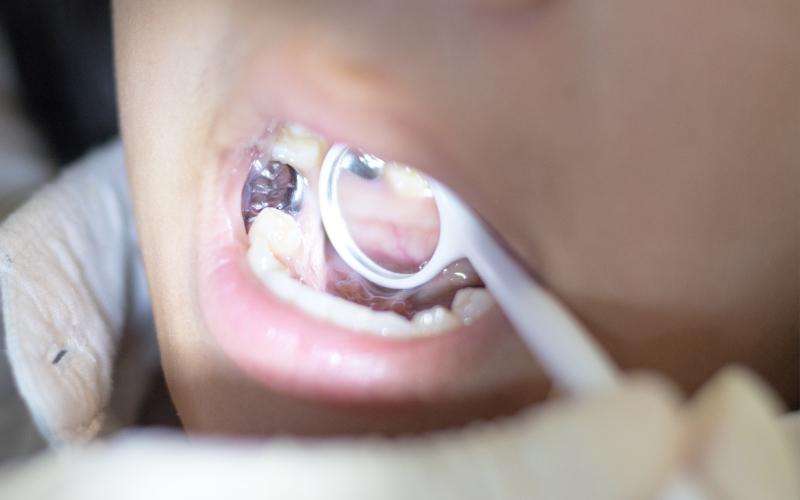New Patients Welcome!

Dental sealants are a powerful weapon in the fight against cavities. These thin, protective coatings applied to the chewing surfaces of your teeth act as a barrier, shielding them from decay-causing bacteria and acids. But with various types of sealants available, choosing the right one can feel overwhelming.
Choosing the right sealant can make a significant difference in your oral health, but with various options available, it can be challenging to determine which one is best for you or your child. This guide empowers you to navigate the world of dental sealants and select the best option for safeguarding your smile:
What’s A Dental Sealant Again?
The chewing surfaces of the rear teeth (molars and premolars) are coated with a thin layer of protective material called a dental sealant. This coating, which is often composed of plastic resin, sticks to the teeth’s depressions and grooves to form a barrier that helps keep bacteria and food particles out of the teeth and away from cavities.
Adults can also benefit from dental sealants in Seattle, but children and teenagers who are more likely to get cavities will benefit the most from them. The application procedure is simple, painless, and a useful preventive tool for keeping dental health maintained because it can dramatically lower the risk of tooth decay.
Understanding Sealants: A Shield Against Decay
- How They Work: Sealants create a physical barrier on the teeth’s biting surfaces, especially the pits and grooves that are naturally more susceptible to cavities. This barrier prevents plaque and food particles from accumulating in these hard-to-reach areas, minimizing the risk of tooth decay.
- The Benefits: Sealants offer numerous advantages, including:
- Cavity prevention: Sealants greatly lower the possibility of cavities, especially in children and adolescents.
- Long-lasting protection: With proper care, sealants can last for several years, offering long-term defense against decay.
- Painless application: The sealant application process is typically painless and swift, providing patients with a nice experience for all ages.
- Cost-effective: Sealants are a preventive measure that can save you money in the long run by avoiding the need for further costly dental operations like fillings.
Types of Sealants: Picking Your Perfect Shield
Teeth sealants come in two primary varieties:
- Bis-acryl: These are the most common type of sealant, offering excellent durability and long-lasting protection. Bis-acryl sealants are typically clear or slightly tinted white.
- Light-cured: These sealants harden under a special curing light used by your dentist. Light-cured sealants come in a wider variety of colors, allowing for a more natural appearance that can sometimes match the color of your teeth.
Choosing the Right Sealant for You!
While both types of sealants are effective, some factors might influence your dentist’s recommendation:
- Your Age: Children and adolescents are more susceptible to cavities, making them prime candidates for sealants. But sealants are also beneficial for adults, particularly for those with deep pits and grooves in their teeth or who are prone to cavities.
- Your Oral Hygiene: If you struggle with maintaining optimal oral hygiene, sealants can provide an extra layer of protection against decay.
- Your Dental History: If you have a history of cavities, sealants can help prevent future occurrences.
- Your Aesthetic Preferences: If you’re concerned about the sealant’s appearance, discuss light-cured options with your dentist to achieve a more natural look.
Finding the Right Dentist for Sealant Application
When seeking sealants in Seattle, look for a qualified dentist experienced in applying sealants for both children and adults. They are able to evaluate your unique demands and suggest the best type of sealant for your unique case.
Maintain Your Sealants for Optimal Protection
- Regular Dental Checkups: Make time for routine dental cleanings and examinations with your dentist in Seattle to allow them to monitor your sealants and ensure they’re functioning properly.
- Proper Brushing and Flossing: Even with sealants, proper dental hygiene, including flossing once and brushing twice daily, is crucial for overall oral health.
- Avoid Hard Foods: Chewing on hard candies, ice, or other hard objects can damage your sealants.
Sealants – Your Smile’s Trusted Shield!
Dental sealants in Seattle are a valuable tool in your preventive dental care routine. By understanding the types of sealants available and consulting with your dentist in Seattle, you can choose the best option to safeguard your teeth and maintain a healthy, cavity-free smile for years to come. Remember, prevention is always better than cure. Invest in sealants and empower yourself to keep your smile healthy and confident.
FAQs :
1. Are sealants just for kids?
While sealants are highly beneficial for children and adolescents due to their developing teeth, adults can also benefit from them. If you have deep pits and grooves in your teeth or are prone to cavities, sealants can offer valuable protection.
2. How long do dental sealants last?
With proper oral hygiene, sealants can last for several years. However, they can chip or wear down over time. Regular dental checkups in Seattle allow your dentist to monitor your sealants and reapply them if necessary.
3. Will dental sealants completely prevent cavities?
Sealants are a powerful tool, but they’re not foolproof. Consistently brushing and flossing your teeth to maintain good oral hygiene is still essential. If you have existing cavities, sealants won’t treat them, but they can prevent them from getting worse.
4. Does getting sealants hurt?
The application process is typically painless and quick. Your dentist will meticulously clean your teeth and apply a conditioning agent before applying the sealant. You might feel a slight pressure or coolness during the procedure.
5. Are there any dangers connected to getting dental sealants?
Sealants are generally safe for most people. However, there’s a very small chance of allergic reactions to the sealant material. Discuss any concerns you have with your dentist in Seattle before getting sealants applied.


